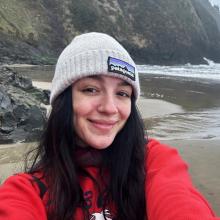
Heather Maran
Tell us about your work/ research. What kinds of things do you do?
When I was an undergrad, my senior thesis was off the coast of Moloka'i, Hawai'i mapping submarine canyons using multibeam sonar and seismic reflection to visualize sediment deposition on the seafloor. Post-graduation, I have been focused on studying coastal geomorphology and monitoring erosion in the Pacific Northwest. Research that I do involves a lot of field work and data analysis studying coastal change using a variety of tools: GPS and lidar equipment to monitor beach/dune/bluff morphology, multibeam sonars to visualize seafloor morphology and substrate change, as well as grain size analysis to understand how the sediment size changes over time.
What sparked your initial interest in your career?
When I first started college, I was a biology major, then switched to environmental science, and then again to geology because I really enjoyed rocks and studying the materials that make up the Earth. My educational path wasn't quite complete until I took a seminar class on hydrothermal vents, where I then signed up a week later to have a double major in ocanography. I thought it was so cool to combine my love for earth materials and the ocean, and my passion for marine geology started! After watching people dive deep into the ocean in a submarine, discovering the unknown, I gained a passion for wanting to be a part of novel research that will transform our understanding of Earth processes.
Who influenced you or encouraged you the most?
My dad, being a marine engineer, was my first big role model. He instilled in me at a young age my love for the ocean and encouraged me to ask questions. As I entered into college, the professors I met along the way continued to inspire and influence me to think outside the box.
What element of your work/ study do you think is the most fascinating?
The most fascinating element of my work is being able to contribute to one of the largest ongoing datasets of coastal morphology change along the Columbia River Littoral Cell, spanning the NW Oregon and SW Washington coastlines. This dataset helps inform coastal planners, researchers, engineers, and local residents about coastal resilience efforts and hazards that may become imminent.
How did you get involved with Ocean Exploration Trust? How did you become part of the expedition team?
I applied for SEIP/SCF after learning about the program from a professor who was a previous seafloor mapping intern.
What other jobs led you to your current career?
After graduating from university, I spent my first summer working as a staff geologist for a geotechnical consulting company, where I was able to test a material's strength properties and determine how they would change under different pressure and moisture conditions. This has given me a good foundational knowledge of sediment properties that I was able to take with me to my new position as a coastal monitoring intern.
What are your degrees and certifications?
Bachelor of Science in Geology and Oceanography -- University of Washington 2023
What are your hobbies?
I enjoy all things that involve being on the beach or in the mountains. Activities I enjoy are archery, film photography, kyaking, hiking, tidepooling, and identifying plants and fungi, just to name a few!
What advice would you give someone who wants to have a career like yours?
If you want to get into marine geology, don't limit yourself to studying one particular subject! Marine geology involves understanding how multiple systems interact, and the more knowledge you gain the more questions you can begin to answer. Secondly, don't be afraid to reach out to other researchers about questions relating to your research or just for some general inspiration; most people want to share their passions with you and won't hesitate to connect with you. Most importantly, try new things, take your time, and don't be afraid to fail.
What excites me the most is knowing that I am studying one of the least explored environments on our planet.
